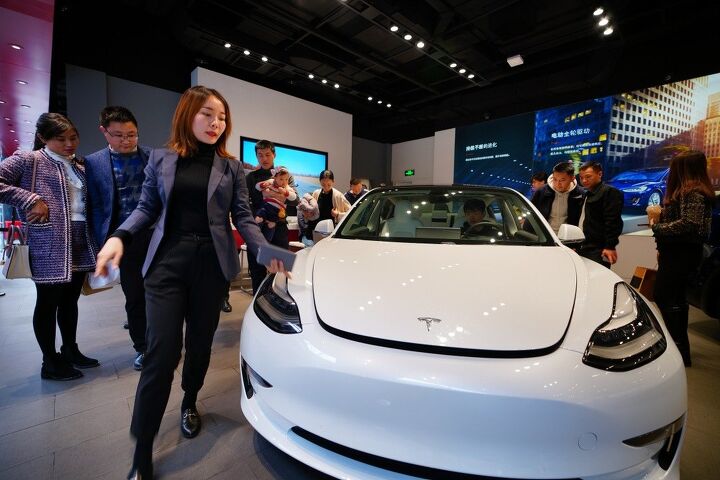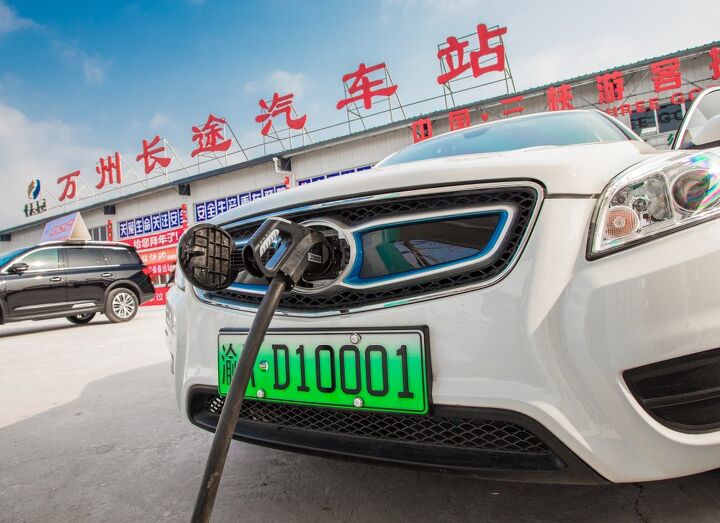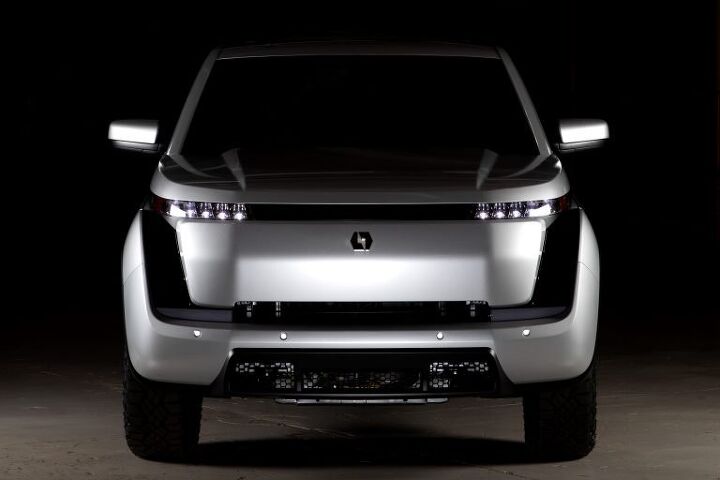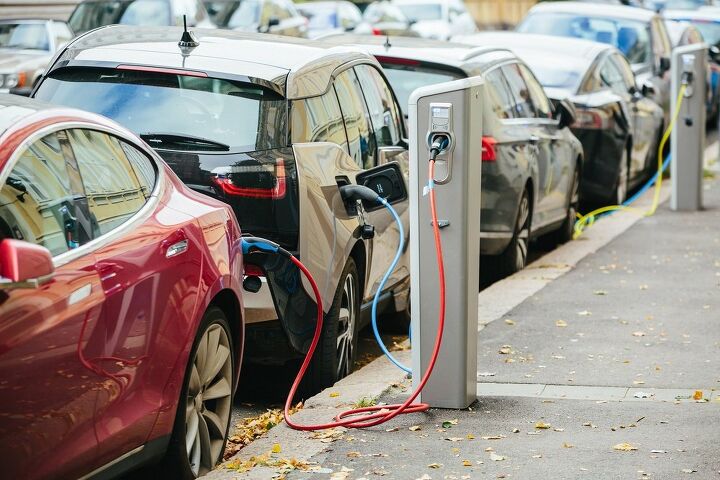#Reports
Study Suggests EVs Cost More to Service
One of the reasons electric vehicles have been so polarizing is down to the near-constant proclamations that they’re the superior mode of transportation. But truth is usually a mixed bag and spending some time with EVs has shown them to have some serious blind spots that will need to be addressed if they’re ever to supplant internal combustion vehicles. Electrics aren’t always the better option, though they do boast features that make them extra desirable to some.
Among those was the promise that owning an EV yielded lower maintenance costs. But there’s a new study out claiming that’s not entirely true. Data is pointing to electrics actually having average servicing fees higher than traditional automobiles.
It's Not Just Pricing, Auto Loans Are Also Getting Out of Hand
As you’re undoubtedly aware, now isn’t the best time to purchase a new vehicle. While you can currently sell your ride for more than it’s realistically worth, the economy is anything but stable as inflation and supply shortages gum up the works. A lack of semiconductor chips has caused the automotive industry to stutter endlessly throughout 2021, with the issue getting so bad that some manufacturers have been building unfinished vehicles just to give their employees something to do. Ford is even mulling over a strategy to ship those units directly to dealerships so they’ll have something on the lot — effectively making its retail network responsible for final assembly.
But the logistics nightmare is only part of the story. Automotive loans are also becoming untenable as terms stretch out endlessly. Cars continue getting more expensive and the average consumer is losing their buying power. The preferred solution is for financiers to extend agreements so customers can continue making the same monthly payments while accruing more on interest over the duration. While effective in the short term, and bound to make banks money as we’re all driven deeper into debt, one wonders how this plays out on a grander scale.
How Long Are Vehicle Prices Going To Remain Insane?
With just about every resource trading at unappealing premiums, now may not be the time to make any major purchases unless you’re a financial masochist or so wealthy that the normal rules of living no longer apply. But it remains a seller’s market for just about everyone, including the plebian masses. Giant, unaccountable financial institutions will happily purchase your home and there’s a sea of disenfranchised people who will give you their last dollar if you can help them make sense of an increasingly hectic world. In the automotive sphere, we’ve seen dealerships and rental agencies hungrily scooping up secondhand automobiles for unheard-of prices just so they’ll have something on the lot.
The end result is a lot of overpriced merchandise that larger businesses are desperate to buy so they can pass on their elevated expenses to the customer. We’ve already covered the stupidly high prices surveyed consumers claimed they’d be willing to spend on a new vehicle. But there have been numerous reports claiming those days are coming to an end, with just as many suggesting we’re still in the thick of it. Yours truly has been wondering just how close to reality those assertions happen to be.
IIHS Claims Marijuana Legalization Causes Crashes
It’s always nice to get a break from the endless stream of industry marketing materials about electrification, though this week’s impromptu theme still involves going green. Following news that General Motors is considering changing its drug testing policies to exclude marijuana, there has been heavy coverage of an Insurance Institute for Highway Safety (IIHS) study claiming states that have legalized recreational use of cannabis are seeing more crashes.
But the framing seems wildly irresponsible as it fails to highlight the problem being heavily tied to individuals operating a vehicle under the influence of marijuana and alcohol combined. It’s more or less what the IIHS attempted to do in 2018 with help from the Highway Loss Data Institute (HLDI). Our guess is that the duo is seeking out fresh reasons for insurance companies to raise rates in regions that have legalized pot because even their own research complicates the issue.
Used Car Prices Have Increased 30 Percent
We’ve been covering the staggering increase of automobile pricing all year, starting with the second-hand surge created by rental industries sucking up used models to replace all the vehicles they dumped during the pandemic. A year of suppressed demand and prolonged restrictions absolutely crippled supply chains and placed the automotive sector in an extremely difficult position going into 2021. We wish we could say things were improving but the most heartening news we’ve come across was the possibility that select manufacturers might soon have a line on semiconductor chips — hopefully encouraging new vehicle production.
But the used market is still heading into uncharted waters. According to data collected by CarGurus, the typical price for a used automobile increased by about 30 percent against this time last year. Though more worrying is how much of that spike is consolidated within the last 90 days.
Pedestrian Deaths Ballooned Against Miles Driven Last Year
The Governors Highway Safety Association (GHSA) released the latest data pertaining to U.S. pedestrian fatalities — indicating that the largest-ever annual increase since we started keeping track in 1975. While the data is preliminary, the association estimated there were 6,721 pedestrian deaths in 2020. It’s a 4.8 percent increase over 2019 and not all that impressive until you realize most people basically gave up their normal driving routine during lockdowns. According to the GHSA, adjusting for miles driven actually results in an annual increase of 21 percent.
It’s genuinely creepy and kind of perplexing with everyone staying isolated. But we’re not going to recommend you start wearing high visibility jackets whenever you leave your home because the mathematical likelihood of being crushed by an automobile remains incredibly low.
Report: People Willing to Pay Stupid Prices for New Cars
While we’d like to get away from stories about everything becoming more expensive, everything actually is becoming more expensive and it looks like a healthy slice of the population is allegedly willing to go along with it. According to the latest data coming from Cox Automotive, roughly 40 percent of the U.S. population would purchase a vehicle at 12 percent above sticker. There’s always been a subset of shoppers who don’t know when they’re being taken but this represents a healthy share of the country.
It makes one wonder where these surveys were being conducted until Cox summarized the situation as the direct result of a populace beaten down by their environment. Apparently, people no longer expect to find good deals and have not yet reached the point where they’ll feel comfortable driving around in the same busted crate that’s seen them through the last decade as a way to save money.
Report: Tesla Won't Be Buying More Land in Shanghai
Tesla has reportedly canceled plans to expand its Shanghai plant. The electric vehicle manufacturer originally intended to make a land purchase and create a global exportation center for its products. But tensions between China and the United States have persisted, making any vehicles shipped to our market substantially less profitable for the company.
Automobiles exported from China are currently subject to a 25-percent tariff issued under the Trump administration as retaliation for the Chinese Communist Party’s heavy restrictions on foreign manufacturers. While Tesla is one of the only companies in existence that isn’t subject to China’s mandatory joint venture, resulting in a factory it wholly owns, the firm would still be subject to tariffs on every vehicle shipped to the U.S. and has recently endured a campaign of negative publicity in the region. China seems suddenly less friendly toward Tesla and it’s responding with the maximum amount of caution.
Chinese Auto Sales Reportedly Rebounding Robustly
The China Association of Automobile Manufacturers (CAAM) is reporting its home market grew 74.9 percent in March, resulting in nearly 2.53 million new-vehicle deliveries. While we’re often skeptical of the organization’s rosy predictions and tallies, it’s claiming the recent sales surge is the direct result of how bad things had been in the previous year. China instituted some of the most aggressive lockdown protocols of any nation in the initial stages of the pandemic and had already been struggling with a declining vehicle market in 2019.
CAAM is making no illusions about the gains being based on anything other than how horrible March of 2020 was and doesn’t want to overpromise moving ahead. It’s a warning that the semiconductor shortage will likely worsen as the year continues, dampening Q2 projections. But the organization has not yet revised its forecast for next year’s overall sales. Last December, CAMM predicted roughly 26.3 million vehicles would be delivered by the end of 2021 and appears to be running with that target.
Hindenburg Research Report Lambasts Lordstown Motors, Fabricated Orders
Hindenburg Research, the firm that outed Nikola for overselling its technology in last year’s scathing report, has selected a new target. The company in its crosshairs this time around is Lordstown Motors. While the investment research firm stopped short of saying the Ohio-based manufacturer committed fraud, it came extremely close. On Friday, Hindenburg alleged that Lordstown is stringing investors along, will be unable to adhere to its existing production targets, and fabricated sales to make the business appear more appetizing.
“Lordstown is an electric vehicle [special purpose acquisition company] with no revenue and no sellable product, which we believe has misled investors on both its demand and production capabilities,” reads the report. “The company has consistently pointed to its book of 100,000 pre-orders as proof of deep demand for its proposed EV truck. Our conversations with former employees, business partners and an extensive document review show that the company’s orders are largely fictitious and used as a prop to raise capital and confer legitimacy.”
Report: 2021 Jeep Wrangler 392 Rubicon Priced at Nearly $80K
We know the 2021 Jeep Wrangler 392 Rubicon and its 470 horsepower and 470 lb-ft of torque is on its way to market. Now we have an inkling on price.
Report: Japan May Ban Internal Combustion Vehicles Next Decade
The Japan Broadcasting Corporation, better known as NHK, reported that the island nation is considering banning new internal combustion engine cars by the mid-2030s this week. While we will continue to maintain that such an effort seems unrealistic when confronting the current realities of the market, Japan’s alleged plan offers a bit more leeway than proposals pitched in parts of Europe and North America. Nippon also finds itself in a better position in the preferred mixed approach of allowing mixed powertrains, which would allow the industry to continue production gasoline-driven hybrids.
For starters, the Asian country has a fairly comprehensive hydrogen fueling network thanks to its small size. It’s also in a position that would make nationwide EV charging more feasible than regions with plenty of wide-open spaces. But automakers aren’t making a peep on the issue, preferring to leave it up to regulators and the market.
IIHS Study Underlines the Perils of Driver Disengagement
It turns out there’s a name for the false sense of security provided by modern driving aids. According to researchers with the Insurance Institute for Highway Safety (IIHS) and the Massachusetts Institute of Technology’s AgeLab, the phenomenon is called “driver disengagement” and it’s assumed to be a contributing factor to roadways fatalities. The duo recently published a rather basic study examining how evolving automotive technologies might be eroding safety under the guise of progress.
Since we’ve been onto the perils and shortcomings of advanced driving aids since their introduction, it also provides us with another stellar opportunity to gloat. Heck, our criticisms go back far enough to predate any reputable research on the matter. We were just bitter cranks then, annoyed that the systems seemed unworthy of our trust despite constantly demanding it. But the IIHS said its latest testing found motorists frequently lose focus while utilizing features like adaptive cruise control and lane-keeping. This issue reportedly worsens the more familiar drivers become with the systems, which would be fine if they could be counted on for total effectiveness. Sadly, there’s been more than enough testing for us to know that’s not the case.
J.D. Power: Totally Changing Society Hasn't Made People Want Electric Vehicles
Despite governments the world over practically forcing electric vehicles down our collective throat via stringent emission standards, the average person living in North America hasn’t changed their mind on them. According to a recent survey by J.D. Power, the “Mobility Confidence Index” for battery-electric vehicles remains largely neutral.
Even as global lockdowns have made them a more viable option, with more people working from home and driving fewer miles every week, North Americans aren’t budging. In fact, citizens of the United States may actually be turning on EVs while Canadians remain slightly more agreeable — something that probably extends beyond the automotive realm.
Study: U.S. Driving Distances May Have Already Peaked, What About Ownership?
North America has changed immensely under the pandemic. The government tested what it could get away with under the premise of health-and-safety-related lockdowns; countless small businesses have gone belly up while larger entities seem to be thriving. Meanwhile, we’ve been informed that nature is returning to urban environments as humanity forced itself to stay indoors. Waters cleared, the air was purified, and animals ventured deeper into our territories while we sheltered in place. It was if Homo Sapiens had finally been demolished, providing Mother Earth a prime opportunity to patch herself up.
For a time, there was even a period where you could enjoy open, nearly enforcement-free roadways. Some cities, including mine, saw traffic declines in excess of 40 percent during the opening weeks of the virus response. While this ended when New York City brought in those temporary (and wildly unpopular) quarantine checkpoints at major crossings and attempted to open up for commerce, it still seems like far fewer individuals are driving overall.
That’s because there are. People just don’t need to venture out of their homes as much in 2020 and it is not just the lockdowns contributing to this change. Ordering items online has played a major factor, as does the increased reliance on at-home entertainment. In fact, a new study has suggested Americans may never drive as much as they did just a decade ago. This seems especially likely with so many companies encouraging office-based employees to continue working from home indefinitely, flushing millions of daily commutes down the proverbial toilet.





























Recent Comments